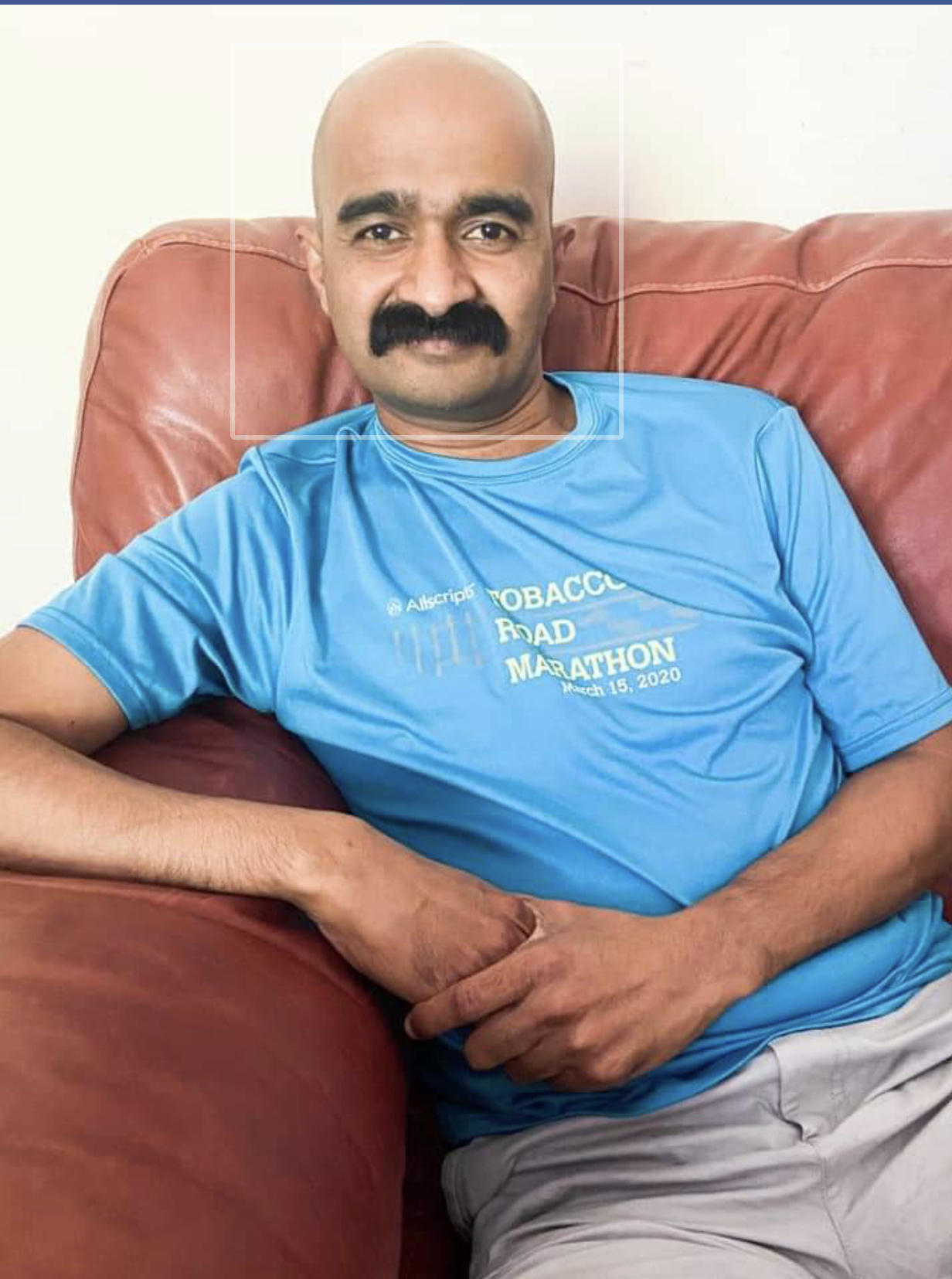
Deepak Musale of Cary, North Carolina, knows this challenge firsthand. Musale, 45, was diagnosed last July with glioblastoma multiforme, a highly aggressive brain cancer. At the time, he was training for the 2019 New York City marathon. It was during a run in early July that he noticed his left hand had become numb. It didn’t concern him enough to stop the run, but he did schedule an appointment with his physician. The symptoms were more pronounced after a lunchtime walk at work July 19. He felt weakness on his left side and had notable stomach discomfort. This prompted Musale, an information technology professional in Durham, North Carolina, to go to his car and call his office. The employee health team responded and took him to the emergency room. An MRI scan detected a mass on the right side of his brain. Musale had surgery July 26 at UNC Rex Hospital, followed by a six-week course of radiation therapy and chemotherapy at the North Carolina Cancer Hospital, the clinical home for UNC Lineberger Comprehensive Cancer Center. Running a marathon On Nov. 3, less than a month after completing his treatment, Musale ran the New York City Marathon. He finished the race in 4 hours and 34 minutes, but his time was slower than he’d hoped. Musale said he was running well for the first 16-17 miles when he realized he forgot to take his anti-seizure medication. He decided it was best to slow his pace to and focus on drinking water more frequently. Still, he crossed the finish line ahead of nearly 25,000 other runners. Simon Khagi, MD, Musale’s neuro-oncologist, said he was struck by Musale’s determination to run the New York City Marathon and his stamina during treatment to maintain his training regimen. “His resilience is remarkable and a testament to the human spirit,” said Khagi, the director of the neuro-oncology and brain metastases program at UNC Lineberger and an assistant professor of neurosurgery and medicine. “When we met to discuss his treatment plan, he was in the process of training for the New York City Marathon, which I did not expect him to continue. He not only continued to train, he also ran two half marathons and the Head for the Cure 5K.” Musale initially wasn’t sure whether he should continue to train for the marathon following his surgery. After an online search, he learned of others with brain cancer who ran half and full marathons. This was the motivation he needed to start running again. Staying focused, staying positive Caption available. Musale running the Richmond Marathon. Musale made some changes to his training program, as well as to his lifestyle, including switching to a vegan diet and adding meditation and breathing exercises. He and his wife, Renu, woke up every day at 4 a.m. and did 30 minutes of meditation and yoga. He then would go for a run either with his wife or his friends, depending on how long he wanted to run that day. Musale said while it was a challenge to train while undergoing rigorous chemotherapy and radiation treatment, he appreciates that Khagi and Ashley A. Weiner, MD, PhD, his radiation oncologist, were supportive and encouraging. He also is grateful for the support of his family and friends. “My family is very positive, and that is what I needed because I see them day in and day out,” Musale said. “From the start of my journey of treatment, and before that, we had a strong support from a few of our close friends who were there at all times with us, be it a doctor’s visit or taking care of our kids in our absence. I think this journey involves more of a strong mind with strong will power and with a strong set of people around you. And thankfully I was blessed with them around me.” Running for health Musale said running has been key to a healthier life. He took up running in 2015 to help him quit smoking. A pack-a-day smoker for more than 15 years, he had tried to quit several times but without success. However, combining his quit attempt with the discipline of running allowed him to break his nicotine dependence. “I started running to help myself to quit smoking, and it also reversed my diabetes and high blood pressure and increased my overall level of health as I was overweight,” Musale said. “I strongly feel that after my brain surgery, running helped me recover quickly from the surgery, and it also boosted my immune system during the six weeks of chemo and radiation. I was able to run four half marathons and two marathons in four months after my surgery.” Since his first race in 2015, Musale has run in several dozen more, including seven marathons and 44 half marathons. He was planning to run the Tobacco Road Marathon on March 15, but it was canceled, and he intends to run the Chicago Marathon and Marine Corps ultramarathon in October and a few local half marathons this spring and fall. He also is sharing his love of running with others. Last fall, Musale and several friends developed a running program for children in the Cary area. Nearly all of those who completed the training program ran the City of Oaks 5K in Raleigh. This year, they are leading another program for children and their parents. “Making kids interested in running – and keeping them away from electronics for a couple of hours – is healthful,” Musale said. And, he added, they may become runners for life.